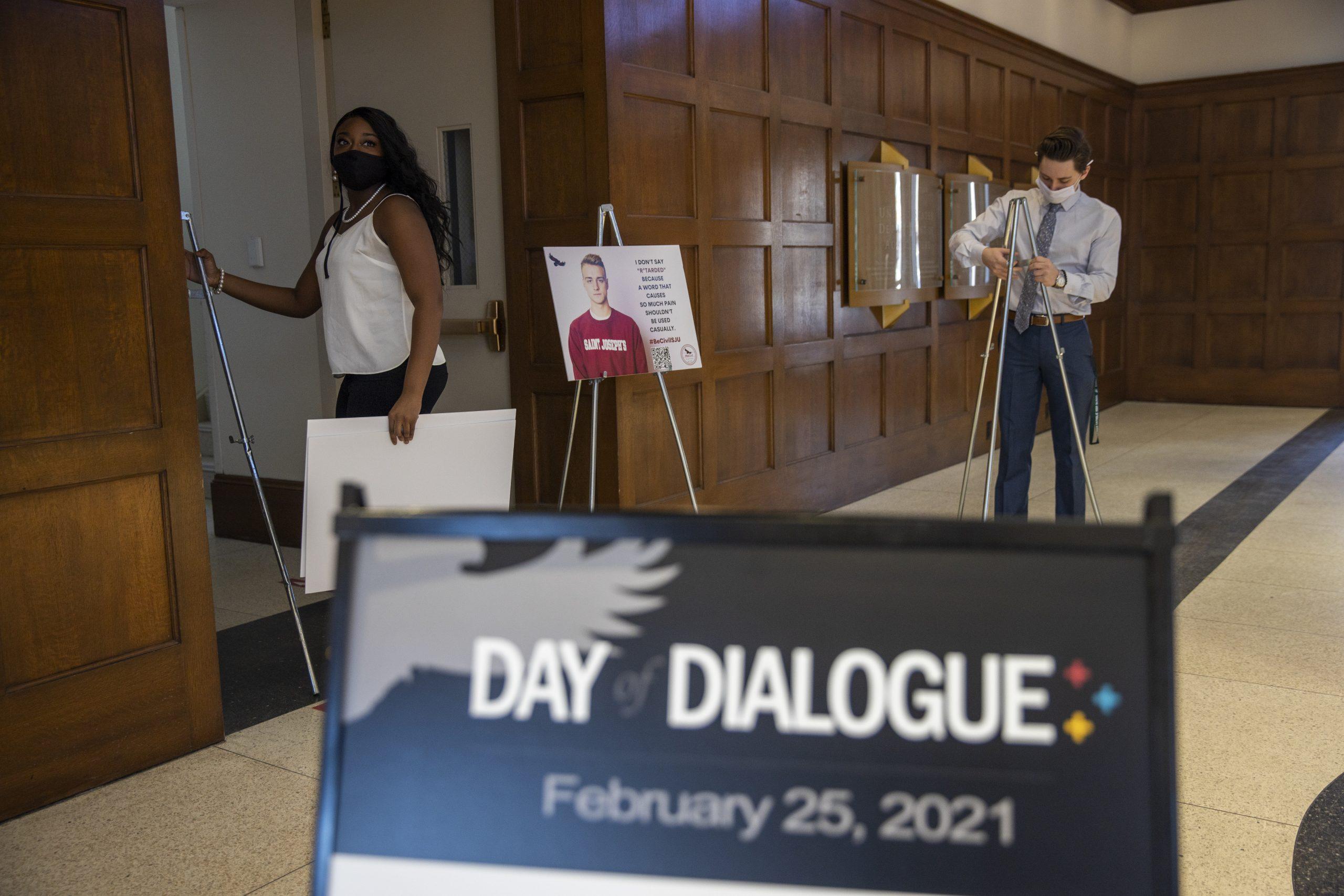As the second annual Day of Dialogue came to a close on Feb. 25, keynote speaker Sharmain Matlock-Turner urged the St. Joe’s community to continue conversations of diversity, equity and inclusion.
“This is a movement, not a moment,” said Matlock-Turner, president and CEO of the Urban Affairs Coalition.
Fifty-three total sessions fostering discussions on topics of anti-racism, bias, gender inclusion, LGBTQIA+ inclusion, professional development and social justice were held both in person and virtually. According to Nicole Stokes, Ph.D., associate provost for diversity, equity and inclusion, over 1,700 students and faculty members attended events this year.
Janée Burkhalter, Ph.D., associate professor of marketing and co-chair for the Day of Dialogue planning committee, wrote in response to written questions from The Hawk that the event went well overall.
“We had a great foundation after last year’s event, so even though we had to plan for both on-campus and online attendance, we started from a great place,” Burkhalter said.
Destiny Little ’23, a member of the Day of Dialogue planning committee, said while she really enjoyed how the day went, one of the specific challenges to this year’s event was the hybrid format due to the pandemic.
“I did miss being able to be with presenters and engage with the people who were in my sessions, but I did go to the BeCivil workshop and I was able to talk to the other people in my session,” Little said. “I miss how it feels to see how people are reacting because they had their masks on, but I appreciate the fact that it was very thought out. There were a lot of intentional things happening throughout that day.”
On Feb. 26, the day after the Day of Dialogue, the Black Student Union (BSU) hosted a reflection on Zoom for anyone to join and discuss how the previous day had gone.
Alaina Head ’23, co-publicist for BSU, helped to lead the discussion during the reflection. Head said the reflection was meant to create a safe space for participants to have an honest conversation about the day and what they got out of the sessions.
Moving forward, Head said the conversations and reflections among the St. Joe’s community cannot stop.
“I want to shift things from dialogue to action,” Head said. “Because yes, dialogue is great in the beginning stages, but I feel like we do a lot of dialogue, and then it’s just that.”
For students who are part of marginalized demographics, the pressure to facilitate both dialogue and action often falls on their shoulders, Little said.
“The university solely depends on the marginalized groups to keep the conversation going, and that’s emotionally draining,” Little said. “If there were more people willing to speak, not necessarily on our behalf, but from the point of view of those who are more privileged in the communities who have to speak up for themselves, that would be greatly appreciated.”
Gabrielle Stevenson ’21, vice president of University Student Senate (USS) and a member of the Day of Dialogue planning committee, said allyship and continued discussion are important for keeping conversations going.
“The main point of the Day of Dialogue is engaging in those conversations that may make us uncomfortable sometimes,” Stevenson said. “We need to keep having these conversations because once we become quiet and complacent, that’s when the work stops. The more we have these conversations, the more likely we are to see results.”
Natalie Walker Brown, director for Inclusion and Diversity Educational Achievement and co-chair of the planning committee, said she hopes community members continue to support one another, long past the annual event.
“I appreciate that the Day of Dialogue is a special opportunity to truly engage all members of our community in this important work,” wrote Walker Brown in response to written questions from The Hawk. “I would like to see us continue to show up for one another in all spaces.”
Ryan Mulligan ’21 and Kaylah Hernandez ’23 contributed to this reporting.















































